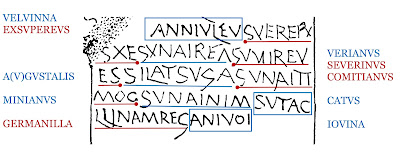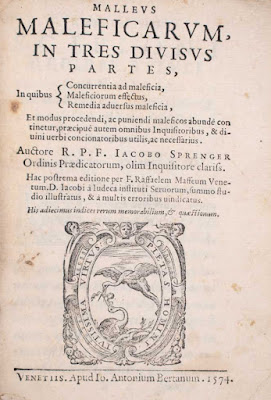“What you lose on the Merry-Totters, you gain on the
roundabouts”
I like using extracts from Comenius’ work; apart from the vast
range of Latin vocabulary the book provides, the illustrations give you an
insight into a child's perspective. They would have
known all these games, and I can imagine them pointing to them in the picture
and probably wishing they were playing them rather than sitting in a classroom!
I’m not too sure about a blowpipe
and bow in a playground.
A single page of Comenius’ work is packed with information
and, despite some of the obvious 17th century references (which are
explained in the notes), the vocabulary is very useful in talking about games, and much of it goes way back to the Mediaeval and Classical periods.
Puerī solent lūdere │ Boys are accustomed to playing [=
usually play]
vel Globīs fictilibus, 1. │ either with bowling-stones
vel iactantēs Globum, 2. │ or throwing a bowl
ad Conās, 3. │ at nine-pins
vel mittentēs Sphærulam │ or striking a ball
per Annulum, 5. │ through a ring
Clāvā, 4. │ with a bandy (club)
versantēs Turbinem, 6. │ scourging [= whipping] i.e. spinning a
top
Flagellō, 7. │ with a whip
vel iaculantēs Sclopō, 8. │ or shooting with a trunk [=
blow-pipe; ‘pea-shooter’]
& Arcū, 9. vel incīdentēs │ and a bow, or going
Grallīs, 10. vel │ upon stilts, or
super Petaurum, 11. / sē agitantēs & oscillantēs. │
getting excited and swinging themselves on a merry-totter [= swing]
[i]
lūdī puerīlēs: boys’ games (or children’s games); although the
noun puer and the adjective puerīlis are most often translated as boy
and boyish (which the title states), the term can refer to both a male and
female child and the adjective puerīlis can also translate as ‘youthful’
soleō, -ēre [2]: be accustomed [+ infinitive: to doing
something]
- Puerī solent lūdere … │ Boys (children) are accustomed to
playing = usually play
fictilis, -e: made of clay, ceramic, earthenware
globus, -ī [2/m] any round object
- Puerī globīs fictilibus [ablative] lūdunt │ The boys
(children) play with bowling stones
iactō, -āre, -āvī [1]: throw
- Globum ad *conās* iactant. │ They throw a ball at the nine-pins
(bowling pins).
https://en.wikipedia.org/wiki/Nine-pin_bowling
*I’m unsure why Comenius used a feminine form to refer to the
bowling pins; it isn’t listed anywhere. The term referring to any form of
‘cone’ shape is:
cōnus, -ī [2/n]: cone; cōnīs lūdō [3]: (New Latin) I go
bowling
images: [i] Roman boys and girls playing some form of ball
game (possibly harpastum; see previous post [ii] Mediaeval bowling
(1468)
[ii]
ān(n)ulus,
-ī [2/m]: ring
clāva,
-ae [1/f]: (CL); club; (New Latin) club bent at the bottom for hitting a ball; it
is used to refer to a type of hockey stick but is listed in the New Latin
lexicon as golf club
sphaerula,
-ae [1/f]: small ball
- Puer
sphaerulam ¦ per annulum ¦ clāvā ¦ mittit. │ The boy sends the small ball ¦ through
the ring ¦ with a club.
[iii]
flagellum,
-ī [2/n]: whip
turbō,
turbinis [3/m] spinning top
versō,
-āre, -āvī [1]: keep turning
- Puer
turbinem flagellō versat. │ The boy keeps the top spinning with a whip.
Images: [i] Extract from ‘Children’s Games’ (1559)
by Pieter Brueghel the Elder; [ii] Ancient Roman spinning top (Egypt; 1st
– 3rd century AD); by G.dallorto - Own work, Attribution, https://commons.wikimedia.org/w/index.php?curid=31342380
[iv]
arcus,
-ūs [4/m]: bow
iaculor,
iaculārī: (deponent verb) throw; hurl; used here to mean ‘shoot’
- Sclopō*
vel arcū iaculantur │ They shoot with a “trunk” or a bow
*The image shows the boy using some form of
blow-pipe / pea-shooter, translated as “trunk” presumably since it’s wooden and
cylindrical. The origin of the word is unclear but appears to be related to: stloppus,
-ī [2/m], a slap (the sound produced by striking upon the inflated
cheek) [Lewis & Short]; also listed as scloppus in Gaffiot); variant
forms appear in manuscripts including sclop- and scoph-, an onomatopoetic word
conveying the sound; it is found in Italian [i] schioppo (gun) and [ii] scoppio
(explosion)
There is a contemporary reference to it as meaning 'gun' by Diego Collado, a
Spanish Christian missionary (1587 – 1638):
illīs etiam ministrāvī quaerendō vīctū alia, sclopōs, et glandēs ... │ For obtaining my livelihood, I also procured other stuff for them: guns and bullets ...
sclopētum,
-ī [2/n] (New Latin) rifle; gun; firearm
[v]
incīdō,
-ere [3]: fall / drop upon something i.e. picture the boy getting on to the
stilts! He would probably use some form of ladder in order unsteadily to “drop
down” upon them.
grallae,
-ārum [1/f/pl]: (CL) stilts; used by actors, but, as one image shows – not only
by actors
Images:
[i] stilt walkers (Greece; 6th century BC); [ii] extract from the Magerius
mosaic (Roman; 3rd century AD; discovered in Tunisia) depicting
venatores, professional wild animal hunters performing at the Games; this one
makes life difficult for himself by fighting on stilts; [iii] they did like to
exaggerate in the Middle Ages!
[vi]
agitō,
-āre, -āvī [1]: excite
oscillō,
-āre, -āvī [1]: swing
You
learn something new every day, and sometimes it’s an English word!
petaurum,
-ī [2/n]: (CL) stage or springboard used by tumblers and ropedancers; (here) a swing
or, far more nicely expressed in the 17th century, a Merry-Totter
Puerī sē agitant vel sē
oscillant super petaurum │ The
boys excite themselves [= get excited] and swing themselves on
the swing.
Image:
Mediaeval “merry-totters” (early 14th century); judging
by the images, the boys in the 14th and 17th century don’t
look that merry.


































